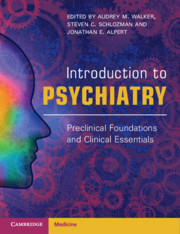Book contents
- Introduction to Psychiatry
- Introduction to Psychiatry
- Copyright page
- Contents
- Contributors
- 1 Introduction
- 2 Clinical Neuroscience
- 3 Introduction to the Patient Interview
- 4 Mood Disorders
- 5 Schizophrenia Spectrum and Other Psychotic Disorders
- 6 Anxiety Disorders
- 7 Obsessive-Compulsive and Related Disorders
- 8 Disorders Related to Stress and Trauma
- 9 Substance Use Disorders
- 10 Personality Disorders
- 11 Neurocognitive Disorders
- 12 Feeding and Eating Disorders
- 13 Child Psychiatry and Neurodevelopmental Disorders
- 14 Sleep Disorders
- 15 Psychopharmacology and Neurotherapeutics
- 16 Psychosocial Interventions
- 17 Psychiatric Evaluation in the Medical Setting
- 18 Psychiatry of Gender and Sexuality
- 19 Health Policy and Population Health in Behavioral Health Care in the United States
- 20 Global Health and Mental Health Care Delivery in Low-Resource Settings
- Index
- References
17 - Psychiatric Evaluation in the Medical Setting
Published online by Cambridge University Press: 22 July 2021
- Introduction to Psychiatry
- Introduction to Psychiatry
- Copyright page
- Contents
- Contributors
- 1 Introduction
- 2 Clinical Neuroscience
- 3 Introduction to the Patient Interview
- 4 Mood Disorders
- 5 Schizophrenia Spectrum and Other Psychotic Disorders
- 6 Anxiety Disorders
- 7 Obsessive-Compulsive and Related Disorders
- 8 Disorders Related to Stress and Trauma
- 9 Substance Use Disorders
- 10 Personality Disorders
- 11 Neurocognitive Disorders
- 12 Feeding and Eating Disorders
- 13 Child Psychiatry and Neurodevelopmental Disorders
- 14 Sleep Disorders
- 15 Psychopharmacology and Neurotherapeutics
- 16 Psychosocial Interventions
- 17 Psychiatric Evaluation in the Medical Setting
- 18 Psychiatry of Gender and Sexuality
- 19 Health Policy and Population Health in Behavioral Health Care in the United States
- 20 Global Health and Mental Health Care Delivery in Low-Resource Settings
- Index
- References
Summary
One out of every twenty emergency department (ED) visits in the United States is due to a psychiatric issue. Providing a gateway between the community and the mental health system, psychiatry emergency clinicians are responsible for assessing and managing a wide array of clinical presentations and conditions. Among emergency mental health-related visits, substance-related disorders, mood disorders, anxiety disorders, psychosis, and suicide attempts are among the most prevalent presentations. Although urgent conditions are common, increasing numbers of patients who present to the emergency department seek treatment for routine or non-acute psychiatric symptoms. Some patients self-refer to the emergency department, while others may be referred by family, friends, outpatient treatment providers, public agencies, or representatives of the law enforcement system.
- Type
- Chapter
- Information
- Introduction to PsychiatryPreclinical Foundations and Clinical Essentials, pp. 415 - 447Publisher: Cambridge University PressPrint publication year: 2021

